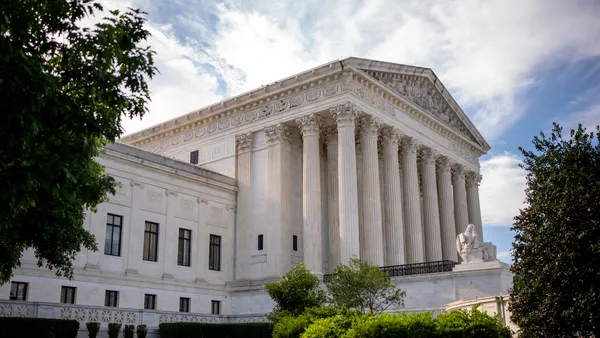Trader Joe’s unlawfully prohibited workers at one of its stores from wearing union insignia on their uniforms ahead of a 2022 vote by employees over whether to formally organize as members of Trader Joe’s United, a National Labor Relations Board administrative law judge has ruled.
According to the ruling, issued Nov. 8, supervisors told several workers at the grocer’s Hadley, Massachusetts, store that they could not wear pins demonstrating their support for the unionization effort because it violated the company’s dress code. Those actions went afoul of the National Labor Relations Act because “[t]he sole reason [Trader Joe’s] sent the two home was their protected union activity of wearing a union button at work,” the judge said.
“Employees long have had a [legal] right to wear union buttons and other insignia at work,” the judge wrote. “When an employer interferes in any way with employees’ … right to display union insignia (whether through buttons, pins, stickers, shirts, hats, or any other accessories or attire), that interference is presumptively unlawful, and the employer has the burden to establish special circumstances that justify its interference.”
Workers at the Hadley store voted in July 2022 to join Trader Joe’s United, making the location the first in the chain to unionize. Employees at Trader Joe’s stores in Minneapolis; Oakland, California; and Louisville, Kentucky, have also voted to become part of Trader Joe’s United, although Trader Joe’s contested the Louisville vote. Workers at a pair of Trader Joe’s stores in New York rejected calls for them to unionize.
According to the ruling, supervisors unlawfully told workers at the Hadley store they had to remove pins they were wearing in support of the union drive or leave work. On two occasions, workers opted to keep the union buttons on and leave their shifts ahead of schedule, the judge said.
The judge also determined that Trader Joe’s was within its rights to terminate a worker at the Hadley store who supported the union but also violated rules about how to behave at work on multiple occasions, including a direction not to use a jigsaw to build signage for the store.
The judge said the company’s move to give a warning to the worker and ultimately let them go did not violate the law because Trader Joe’s showed “that it would have discharged [the worker] absent his protected concerted activity.”
In addition, the administrative law judge concluded that Trader Joe’s decision not to provide the same retirement benefits to workers at the Hadley and Minneapolis stores as it does to nonunionized workers for the chain violated federal law. Trader Joe’s initially told Trader Joe’s United it would give the unionized workers the same retirement payments as the other workers, but later reneged on that promise, the judge ruled.
“We are pleased with the NLRB Administrative Law Judge’s determinations in favor of Trader Joe’s, including that we do not terminate Crew Members’ employment because they support unionization,” a Trader Joe’s spokesperson said in a statement. “As we have always said, Trader Joe’s supports our Crew Members’ rights to choose whether or not they want to be represented by a union.”
The spokesperson added that Trader Joe’s disagrees with other findings by the judge and intends to appeal them.















